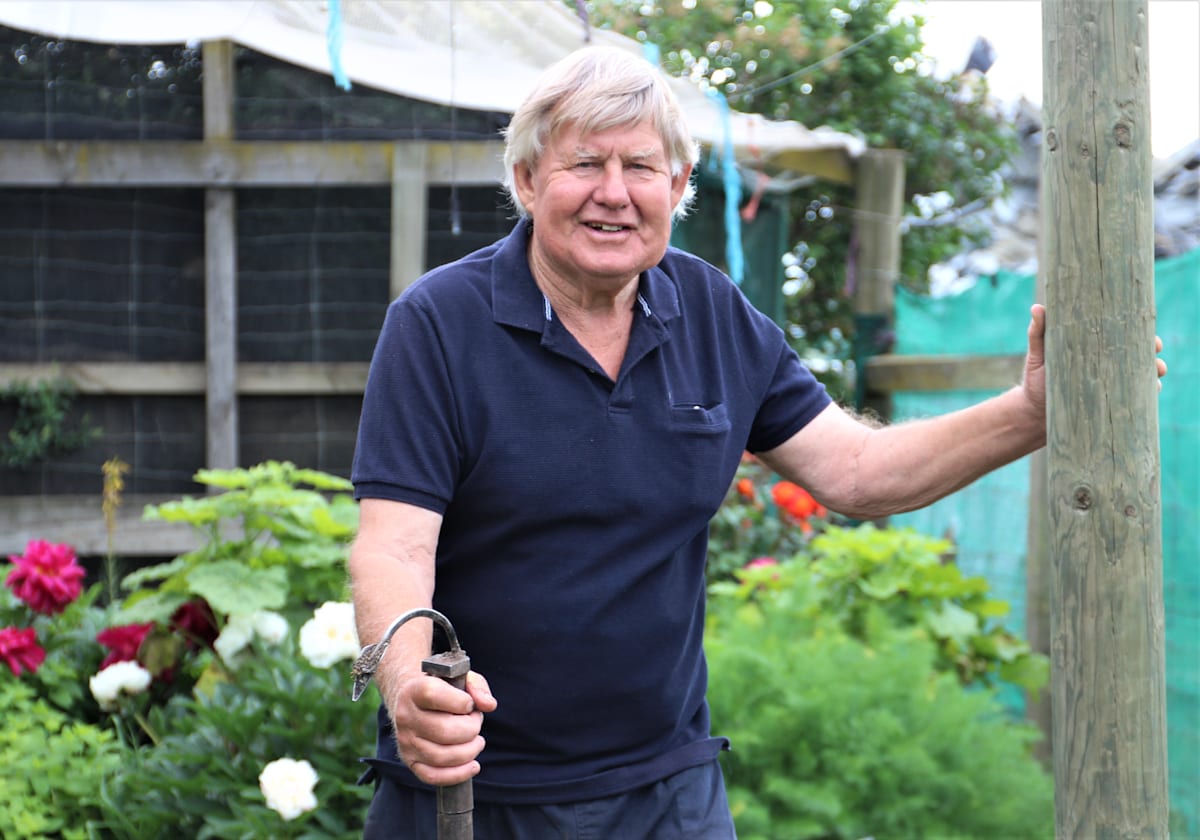
Rising property values and an expanding industrial zone in Central Otago are putting the squeeze on a decades-old natural-waste disposal operation
His knees and his back might be starting to give out but when the local council tried to move on pioneering worm farmer Robbie Dick he had no trouble digging in his toes.
Dick, who is 75, has spent 23 years collecting thousands of tonnes of organic waste from orchards, farms and supermarkets and turning it into nutrient-rich fertiliser and soil conditioner.
Millions of tiger worms do the job and the worms themselves have been couriered all over the country to start more farms and consume all manner of human, animal, vegetable and even biodegradable waste such as cardboard.
READ MORE: * Central Otago town hits pay dirt * Wild pines endanger Central Otago's character
His plot is on the edge of Cromwell’s fast-growing industrial area on a council-owned 52ha block of land.
Big profits await landowners who can subdivide and sell here in the hub of the ongoing Central Otago and Lakes District development boom.
The Central Otago District Council is rezoning the land to allow an industrial subdivision as part of a master-planning exercise to manage growth.
Plan change 18, if approved, will reclassify the largely unoccupied site off Bannockburn Rd from rural resource area to industrial resource area.
The subsequent section sales will earn millions of dollars for the council, which faces big bills to upgrade town facilities and accommodate new residents.
When Dick learnt his lease would not be renewed, it was a major blow. Moving 1.5km of buried piping, concreted-in posts, sheds, gardens and row upon row of busy worms is not practical, he says.

With the site gone, Central Wormworx would be unsaleable and next to worthless, but the end of the operation was the worst prospect.
“It would be great pity as we’ve done a good service for the district over the years and a lot of people have supported us. I’ve worked at it seven days a week and I’d like to see someone take over and be successful to keep the initiative going.”
The worms consume 25 tonnes of waste a week, much of it apple pulp from orchards.
New customers are constantly being found, Dick says, the latest a large beef feed-lot operation looking to process waste and return soil conditioner to its paddocks.
Last week he was at Waitaki Boys’ High School in Oamaru helping students set up a worm farm to deal with waste from the canteen.
“They got a grant to do it but I’ll just charge them a bit of petrol money. I’d like to see most of the money go to what they’re doing there.”
Please re-lease me
Neighbouring recycling business Otago Metals Central was also told its council lease would be expiring with no certainty of renewal. Part-owner Graham Rollo says the prospect of having to move the business, which requires a big yard space and central location, is a worry.
Across town at the Big Fruit reserve mini-golf operator Shona Rae is also feeling ripples from the council’s master-planning exercise. When her long-term lease came up for renewal she declined to sign what was offered and has been occupying the site without a lease agreement for nearly 18 months.
The sticking point is the shortening of the lease term from 20 years to two, Rae says, with a right of renewal for another two that can be cancelled at six months’ notice.
Her site has been mooted by council planning consultants as a possible future location for a theme park.
Rae says the terms offer no future security for the business making it unviable for anyone else to take on and effectively worthless as an asset.

For the metal recycler, however, changes are afoot and in June Rollo said the council had extended his lease. No similar offer had been made to Wormworx and no explanation given.
In September the Cromwell Community Board was told by council staff that Otago Metals Central had sold the business. The board approved the lease extension for the new owner and also a future possible option for it to buy the land.
It was salt in the wound for Dick, who told Newsroom at the time he couldn’t see a way forward for Wormworx.
“The council has a new plan and we’re not in it. Now I have to try to sell it off in parts. I’d never move it and put it down again. That’d be a mammoth job - too hard.”
He was grateful the council helped get the business started and had offered him an alternative plot. But efforts to explain it is not a relocatable operation fell on deaf ears.
Dick says the council was missing the big picture so when staff visited recently he made the most of the opportunity.
“I probably got a bit irate but I told them we are an area that grows things - all the orchards, the fruit - and we also need to get rid of organic waste.
“I sell lots of worms to Queenstown and the council there subsidises people 50 percent of the normal price to get worm farms going. This council doesn’t do that.”
His case was taken up by community board deputy chair Bob Scott, who felt the business needs more time and equal opportunities. Scott questioned why one tenant can be offered a lease extension but not the neighbour.
Worthy wastebusters
Otago Regional Councillor Alexa Forbes, who has viewed the worm farm as part of her role, says climate change and waste management create a need for composting and caring for soils and she thinks councils should prioritise such businesses.
“What Wormworx is doing in returning organics to the soil needs to be valued by the community. The value of this site is far greater than just the financial value of the land.
“Carbon is being sequestered and a valuable product created. Losing a facility like that anywhere in the country should be actively avoided. We need to value these businesses and land that is used in this way.”
The Central Otago council pays to dispose of organic waste at the Victoria Flats landfill owned by neighbouring Queenstown-Lakes council. In April it agreed to sell a third of $900,000 worth of carbon credits from council-owned pine forests to cover a budget blow-out from the rising cost of waste disposal.
In July, however, the council said it had contracted EnviroWaste to start collecting organic waste from the kerbside from next winter, which is expected to ease the disposal issue.
Temporary reprieve
And last month the worm finally turned and the council offered Dick a one-year lease extension with a right of renewal to 2026. It is expected to be formalised by early next year.
The council’s planning and environment manager, Louise van der Voort, said a request by Wormworx to extend the lease in 2020 had been declined “so that the decision aligned with long-term planning for Cromwell as identified in the Cromwell Spatial Plan”.
“As two years have passed the council has a better understanding of the timeframes associated with the plan change and the proposed development of the land.”
This week Dick and Wormworx assistant manager Jacqui Beech are feeling relieved and looking more positively to the future.
“It’s been stressful not knowing. This gives us some security and I’ve got time now to get a partner in or something like that,” Dick says.
The pair are planning a month’s break from shipping worms around the country to allow numbers to build up to meet demand.
Made with the support of the Public Interest Journalism Fund








